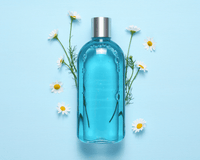Madam C. J. Walker (1867-1919) is the first African American millionaire who invented black hair care products dubbed "America's first Black lady billionaire" for her handmade line. Sarah Breedlove, the child of slave grandparents, was motivated to design her personal hair care products after suffering from loss of hair, which resulted in the development of the "Walker system" of hair products. Walker, a capable businesswoman with a spiritual inclination, developed a commercial company by first selling to Black females directly, then recruiting "beauty culturalists" to equip her wares. She was widowed when she was six, married at fourteen (to Samuel McWilliams, with whom she had a son, A'Lelia, in 1885), and died as a widow when she was 20.
Walker and her 3-month daughter A'Lelia relocated to St. Louis, where Walker worked as a laundress while still attending night school. She performed in the St. Paul African Methodist Episcopal Church choir and got involved in the Advancement Of coloured People. She initially met Charles J. Walker in St. Louis, the man who would become her second husband and inspire her name to her future empire.
First African American Millionaire Invented Black Hair Care Products Method
Walker was motivating to produce hair care products for Black women after suffering from a scalp condition that led her to lose a significant amount of her own hair. She devised a technique that will radically transform the Black hair care business.
Walker's technique, dubbed the "Walker system," included scalp preparation, moisturizers, and iron combs. Her personalized pomade was a smashing success. While there were other products for Black hair on the market (many of which were made by white firms), she distinguished hers by highlighting its focus on the health of the women who would use it. She marketed her handmade items to Black women directly, employing a personal approach that earned her devoted clients.
Company of Madam C.J. Walker
Walker arrived in Denver, Colorado, in 1905 with only $1.05 in her pocket. Her goods, such as Wonderful Hair Grower, Glossine, and Vegetable Shampoo, began to develop a dedicated following, and her circumstances began to change. Charles J. Walker arrived in Denver in 1906, and they married shortly thereafter. Her spouse initially assisted her with marketing, advertising, and mail orders, but as the business expanded, they became estranged and divorced.
Walker named a beauty school and company after her daughter in Pittsburgh, Pennsylvania in 1908. In 1910, she relocated her company's headquarters to Indianapolis, a city with train connections for distribution and a substantial African American client base. She delegated control of the Pittsburgh branch to A'Lelia. At its peak, the Madame C.J. Walker Company employed over three thousand workers, the majority of them were Black women who marketed Walker's wares door-to-door.
Walker was the Mona Lisa of black beauty companies if imitation is the best form of flattery. One of the most ridiculous knockoffs was the light-skinned “Madam Mamie Hightower” company. Walker opted to put a unique stamp with her picture on every parcel to keep the others away. Walker was so effective, and so fast, in cementing her presence in the consumer's consciousness, that when her marriage to C.J. fell apart in 1912, she insisted on preserving his name. After all, she'd actually made it more well-known.
‘America's First Black Lady Millionaire'
Walker grew to fame as one of the most well-known African Americans, and he was revered by the Black press. Her economic success enabling her to live in residences that were far removed from the one she had grown up in; when her daughter acquired her Manhattan townhouse in the 1920s, it became a salon for members of the Harlem Renaissance. Vertner Tandy, a Black designer, created Walker's rural estate, Villa Lewaro, in Irvington-on-Hudson.
Walker's success as an entrepreneur was only rivalling by her reputation as a philanthropist. She formed clubs for her staff, encouraging them to volunteer in their communities and paying them with incentives when they did so. She fostered female talent at a period when opportunities for Black women were few, even stating in her company's charter that only a woman may serve as president. Walker generously gave to educational causes and Black charities, financing Tuskegee Institute scholarships for women and giving to the NAACP, the Black YMCA, and hundreds of other organizations that helped shape Black history.
Walker once stated that her hair grower's formula came to her in a dream: "God answered my request because one night I had a dream in which a large Black guy appeared to me and told me what to make for my hair. Some of the cure was growing in Africa, but I order it, blend it, apply it to my scalp. A few weeks, my hair was growing back quicker than it had ever before. I tested it on my friends, and it worked for them. I made the decision to start selling it."
The idea Of Madame C.J. Walker
Walker's first products, in addition to her hair grower, were Glossine (a pressing oil) and a vegetable shampoo. She advised consumers to shower more frequently and to use her "Walker System," which included the use of a hair grower, oil, and heated combs to promote healthier hair. Despite the fact that she pioneered hot combs for straightening hair. Walker's objective was not to change the look of Black women's hair.
"Let me clarify the mistaken notion that some have that I claim to straighten hair," Walker once said. "I despise such an image since I've always presented myself as a hair culturist. I'm a hairdresser." Walker travelled to Denver in 1905 to promote Poro goods while continuing to explore her own hair care treatments. She worked as a chef for pharmacist Edmund L. Scholtz, who may have assisted her in comprehending the chemistry of such goods. She married Charles Joseph Walker in 1906 and began calling herself Madam C. J. Walker, a name she used when the marriage ended. She creating her own recipe at this point to cure scalps and promote hair growth. Walker left Turnbo in 1906, and the Madam C. J. Walker Manufacturing Company began marketing Madam C. J. Walker's Wonderful Hair Grower.
The Death And Legacy Of Madame C.J. Walker
Madam Walker died of hypertension on May 25, 1919, at the age of 51, at her rural house in Irvington-on-Hudson. After her death, her designs for her Indianapolis headquarters, the Walker Building, were followed out and finished in 1927. She is regarded today as a trailblazing Black female businesswoman who encouraged many with her economic freedom, business skill, and generosity.









